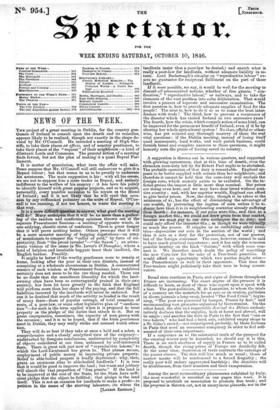A suggestion is thrown out in various quarters, and supported
with growing earnestness, that at this time of dearth, even the shrunken corn-duty left by Sir Robert Peel ought to be abolished. The probable operation of that duty is remarkable. England ap- pears to be better supplied with cereals than her neighbours; and therefore it cannot be held that the corn-duty will exclude the foreign corn, which scarcely exists to be excluded. On the in- ferior grains the impost is little more than nominal. But prices are rising even here, and we may have dear bread without posi- tive scarcity ; and, with her superior wealth, England can afford to give better prices. Now, the duty, though it be taken at the minimum of 4s., has the effect of diminishing the advantage of our wealth, by preventing the ingress of corn unless it be 4s. dearer here than it is in neighbouring countries already suffering from dearth : for instance, if our price were 6.3s., and that . in a foreign market 64s., we could not draw grain from that market, because we must pay to our own exchequer the 4s. duty, and could only afford the importer els. ; as though we were virtually BO= much the poorer. It cripples us in outbidding other coun- tries—depreciates our coin in the auction of the world ; and thus it acts as a duty for the protection, not of our grower, but of the foreign consumer. The case, however, cannot be said to have much practical importance ; and it has only the remotest possible bearing on the Irish "famine," with which some con- nect it. We therefore much doubt the policy of unsettling the new Corn-law for the sake of a Free-trade punctilio. It would afford an opportunity which two parties might seize— the Protectionists as well as their opponents. This time the Free-traders might judiciously take their turn in being conser- vative.


























